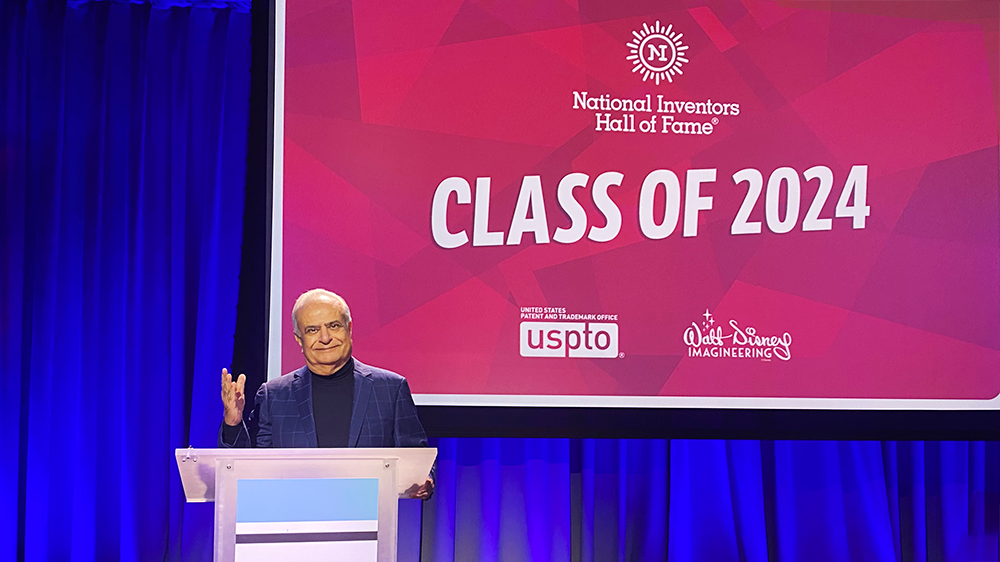Distinguished UCLA Engineer Elected to National Inventors Hall of Fame

UCLA Samueli
Double Bruin engineer and UCLA Samueli distinguished adjunct professor of electrical and computer engineering Asad Madni has been selected to join the 2024 class of the National Inventors Hall of Fame.
Asad Madni ’69, M.S. ’72, a distinguished adjunct professor and distinguished scientist of electrical and computer engineering at the UCLA Samueli School of Engineering, has been selected to join the 2024 class of the National Inventors Hall of Fame.
The nonprofit organization, working in partnership with the United States Patent and Trademark Office, announced its newest 15 inductees yesterday at an event in Glendale, California. Madni is recognized for leading the invention and commercialization of the Quartz MEMS (Micro-Electro-Mechanical Systems) GyroChip, a life-saving sensing technology that revolutionized navigation and stability for aerospace and automotive safety systems.
Prior to his retirement in 2006 from BEI Technologies Inc., Madni served as the firm’s president, chief operating officer and chief technology officer over a span of 14 years after BEI acquired Systron Donner Corp, where Madni worked from 1975 to 1992 — initially as an engineer and eventually as the company’s chairman, president and CEO. During his tenure at BEI, Madni made intelligent, high-precision sensors and systems for aerospace, defense, industrial and transportation applications, including the control system for Hubble Space Telescope’s star selector. The slow-motion, dual-axis, servo control system enabled Hubble’s unprecedented pointing accuracy and stability, resulting in remarkable images, such as the ones captured by the telescope in the photograph “Pillars of Creation,” that have enhanced our understanding of the universe.
In the 1990s, Madni introduced the world to his MEMS GyroChip sensors, which can detect and measure the motion of an object. The affordable technology has since been used worldwide to enable precise guidance, navigation and control in numerous aircraft and passenger vehicles. More than 55 million GyroChip sensors have been installed in cars, enhancing electronic stability control and saving lives by preventing rollover accidents. These tiny, tuning fork-looking devices have helped made autonomous vehicles a reality and ushered in a paradigm shift in the automotive industry in the late 1990s. The technology has also been used on commercial airliners, defense systems and even the Mars Sojourner rover.
A native of Mumbai, India, Madni received his B.S. and M.S. in electrical sciences and engineering from UCLA before earning a Ph.D. in engineering from California Coast University and an S.E. from MIT Sloan School of Management. He holds 28 U.S. patents and has received more than 100 awards, including the John Fritz Medal, the IEEE Medal of Honor — the highest recognition of the Institute of Electrical and Electronics Engineers (IEEE), the Royal Academy of Engineering’s Prince Philip Medal, the Elmer A. Sperry Medal, the ASME Soichiro Honda Medal, the Ellis Island Medal of Honor, the IET J.J. Thomson Medal and the UCLA Professional Achievement Award. Madni has been elected to the National Academy of Engineering, National Academy of Inventors, Royal Academy of Engineering and Canadian Academy of Engineering. He has also been awarded six honorary doctoral degrees and seven honorary professorships. At UCLA Samueli, he received the Alumnus of the Year and Lifetime Contribution awards.
With his induction to the National Inventors Hall of Fame at an event in May in Washington D.C., Madni will join the ranks of some of the world’s most pivotal inventors, such as Louis Pasteur, the inventor of pasteurization; Samuel Morse, who invented the telegraph and Guglielmo Marconi, the inventor of the radio.
